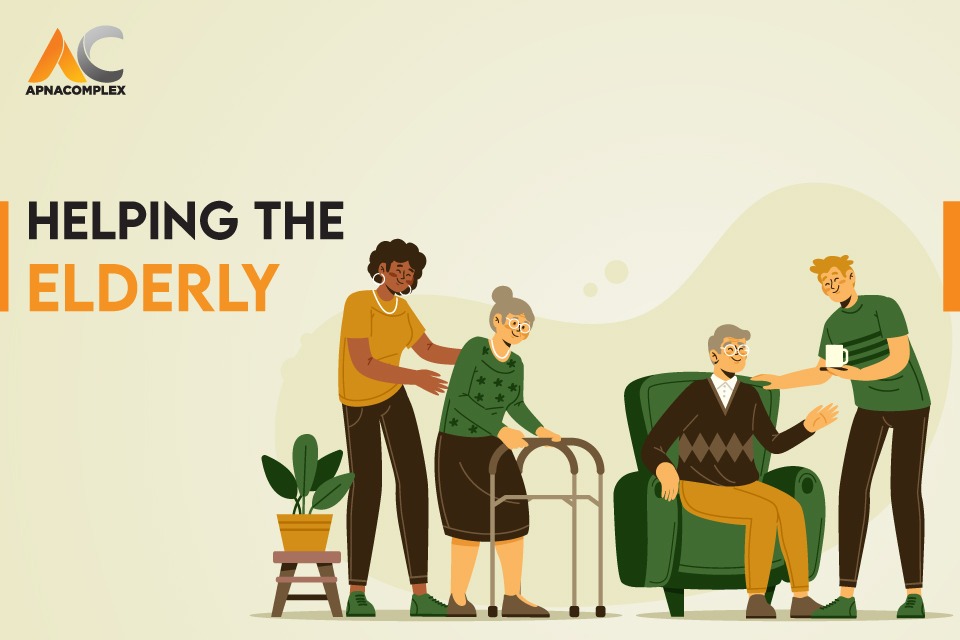How Residents can Help their Elderly Neighbours
Product News elder care, elder-friendly society\, elderly neighbourThe elderly have always been valued members of every community in India. Grandparents, older neighbours, and even unknown seniors are treated with respect and deference. However, urbanisation and the growth of nuclear families have had an adverse impact on this tradition with more and more elderly now often living on their own.
The increasing isolation of the elderly becomes even more concerning when we consider their expanding population which is expected to rise by 41% in the coming decade to reach 194 mn in 2031. It means that we are likely to have more and more elderly people in our neighbourhood.
Why the elderly may need help?
In the absence of the traditional joint family, many senior citizens today are often living alone or may not have sufficient help at home. This can be both emotionally and physically challenging for older people. They are highly likely to suffer from anxiety regarding their health. Advancing age also increases the likelihood of severe cognitive impairment and mental and neurological disorders like dementia or alzheimer’s.
Physically, the aged population is the most vulnerable as the incidence of chronic diseases like hypertension and diabetes increases with age. It also takes them longer to bounce back from an illness. As their overall energy and strength levels decrease with age, the ability to take up strenuous work also becomes limited.
But one of the biggest reasons why we must go out of our way to help elderly neighbours are the intangible benefits that we can gain, including wise counsel and companionship.
How can resident associations help the elderly?
Resident associations can take some simple but very effective steps to help their elderly members, such as:
Checking regularly: A small team should be assigned to regularly check on the aged population that lives alone. This should preferably be done through in-person calls since many older people may be reluctant to share their concerns to avoid burdening others. It can also go a long way in lessening their feeling of isolation.
Assign an emergency team: One of the major concerns among older people is falling severely sick where they may need urgent medical assistance. Hence, it is advisable to assign a team that can be available in an emergency. The team should have contact details of aged residents and their next of kin. They should also make themselves aware of the procedure to follow in case of a medical emergency in terms of notifying family members, calling an ambulance and keeping a tab of nearby health centres.
Ensuring safe neighbourhood: An accidental fall can have a far-reaching impact on the elderly. As bones get more brittle with time, a fracture often takes a very long time to heal, further curbing their mobility. Yet, senior citizens must stay physically active. Hence, care must be taken that walkways are properly maintained and there are no obstacles, bumps, and uneven surfaces. Avoid putting any stairs on walking routes and ensure every place can be accessed by a wheelchair. Similarly, terraces and stairs should always have handrails.
Space for rest and community: The walkways should have benches at certain intervals to allow people to take some rest on their walk. A place for elders to gather and meet their contemporaries is also extremely important as this sense of community can be vital for their mental wellbeing.
Helping with chores: Reach out frequently to the senior citizens in the society to find out if they need help with chores. This can include carrying out their grocery shopping, driving them to a meeting or religious place, or for smaller tasks around the house.
Involving in community activities: Make the effort to involve senior citizens in community activities, such as appointing them in an advisory role for community-wide events or religious functions. We can identify people with unique skills and qualifications, such as those interested in arts or gardening, and involve them in related activities.
These are just some of the small steps we can take to create a safe and friendly atmosphere for the elderly neighbour in our community. Remember, frequent visits, phone calls, and just staying constantly in touch with them will go a long way in fostering their wellbeing and happiness.
How does ApnaComplex help in creating elder-friendly societies?
As an apartment management app, ApnaComplex can help in driving elder-friendly environment in a residential complex through the following features:
Gatekeeper: With security being one of the key concerns for most senior residents, entry regulations through ApnaComplex Gatekeeper feature ensures a comprehensive security system. Residents receive real-time notifications on visitors, pre-approve entry of chosen guests or delivery personnel, and can track staff attendance.
Communication: This feature provides senior citizens an opportunity to connect with others in the community. The app contains discussion forums and groups where they can find like-minded people, seek companionship, or find useful information. It also acts as a crucial information platform through Community Wiki, Notice Board, and Document Repository.
Online Society Helpdesk: One of the main challenges for many senior residents is ensuring regular maintenance of repair of their home. Today, many housing complexes offer these services for residents. With the Online Society Helpdesk, residents can raise complaints and drop suggestions. It allows the society management to track redressal of complaints, ensuring timely resolution.
With end-to-end apartment management solutions, ApnaComplex allows resident associations to create a safe, friendly, and convenient place for elderly neighbours.
